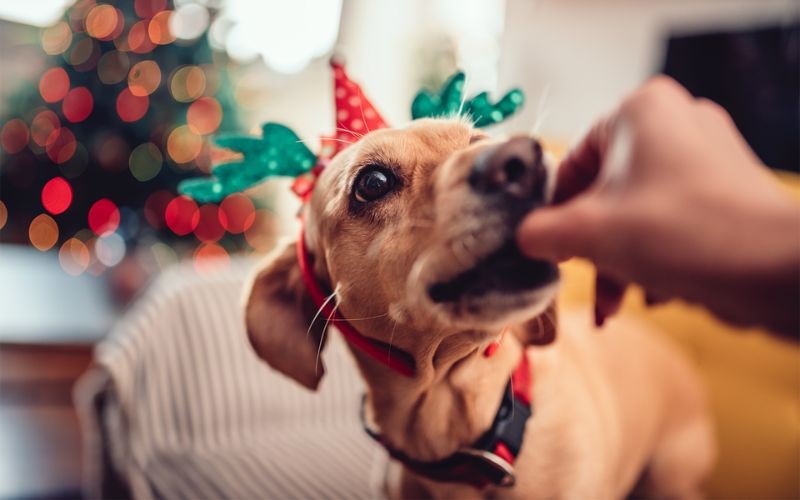
Holiday Food Safety Guide: Keeping Your Pup Safe During the Holidays
The holiday season is a time of joy and togetherness, and for many, that includes furry family members. As we deck the halls and prepare festive feasts, it's crucial to be mindful of our dogs' well-being. Amidst the seasonal delights, there are hidden dangers in the form of certain foods and plants that can pose serious risks to our four-legged friends.In this article, we'll navigate the culinary landscape of the holiday season, highlighting what to avoid and offering a safer, dog-friendly alternative. Let's ensure that the festivities remain joyous for everyone, including our beloved pets!
Steer Clear of Toxic Foods
Many common holiday foods and ingredients can be harmful to our dogs. From desserts and drinks to salads, here's a list of what you should keep out of reach (or jumping distance!) and avoid feeding your pup. Remember, preventing access to these items (and possibly hiding them from curious noses!) is key to your dog's safety.
- Chocolate: Contains theobromine and caffeine , which are toxic to dogs.
- Grapes and raisins: Can cause kidney failure in dogs.
- Onions and garlic: Contains compounds that can damage a dog's red blood cells. Stuffing and seasonings in holiday dishes might contain these ingredients, which are harmful to dogs.
- Macadamia nuts: Can cause weakness, vomiting, tremors, and hyperthermia in dogs.
- Xylitol (artificial sweetener): Found in sugar-free gum, candies, and some baked goods, which can cause a rapid release of insulin in dogs, leading to low blood sugar and liver failure.
- Alcohol: Can cause intoxication, coma, and even death in dogs.
- Fatty foods: Turkey skin, gravy, and other high-fat foods can cause pancreatitis in dogs.
- Bones: Cooked bones can splinter and cause internal injuries or blockages.
This list is not exhaustive, use caution and consult your vet if you think your pet ingested something they shouldn’t have! In general, human food and foods high in fat or salt should be avoided.
Be Aware of Poisonous Holiday Plants
Holiday plants make the season all the more festive, but these traditional Holiday plants are toxic to dogs:
- Poinsettia: Contrary to popular belief, poinsettias are midly toxic , but they can still cause irritation in a dog's mouth and stomach if ingested, resulting in drooling, vomiting, or diarrhea.
- Holly: Holly can cause gastrointestinal upset and irritation to a dog's mouth if consumed. Ingestion of the berries can be more toxic than the leaves.
- Mistletoe: Mistletoe is highly toxic to dogs and can cause vomiting, diarrhea, difficulty breathing, slowed heart rate, and potentially more severe symptoms if a significant amount is ingested.
- Holiday tree pine needles: The oils and needles of Holiday trees, such as pine, fir, and spruce, are not necessarily poisonous but can cause stomach irritation, vomiting, and possible injury to the mouth or digestive tract if a dog ingests them.
- Amaryllis: This plant is highly toxic to dogs and can cause vomiting, diarrhea, abdominal pain, tremors, and more severe symptoms if ingested.
- Holiday cactus: While not toxic according to the Animal Poison Control Center, Holiday cactus can cause gastrointestinal upset if ingested by dogs.
Understanding Safe Foods for Dogs
It's heartwarming to include our dogs in the holiday feasts, but awareness of safe foods is essential.
The list of permissible foods, includes:
- Turkey meat without skin and bones
- Lamb meat without bones
- Green beans
- Brussels sprouts
- Parsnips
- Carrot
- Peas
- Sweet potatoes
At the end of the day, opting for dog food is the safest choice! Explore these delicious options that your furry friend will enjoy just as much. Consult a Farmina Nutrition Consultant to get a personalized nutrition plan!
In Summary: a Pawsitively Safe and Festive Season
As we revel in the holiday spirit, let's prioritize the health and safety of our canine companions. Steering clear of toxic foods and being vigilant about holiday plants is the key to a hazard-free celebration.
Remember, when in doubt, consult your veterinarian. While sharing the joy of the season with our dogs is heartwarming, sticking to a list of safe foods ensures that the holidays remain a time of merriment for both humans and their furry friends.
Opting for dog-friendly alternatives and seeking guidance from a Farmina Nutrition Consultant can make the festive season a truly joyful and worry-free experience for everyone. Cheers to a happy and healthy holiday season with our cherished canine companions!

